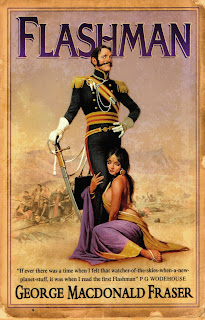Flashman: A novel
George MacDonald Fraser
No less an author than P.G. Wodehouse blurbed George MacDonald Fraser's Flashman. This quote can be found on the cover of one edition, "If ever there was a time when I felt that watcher-of-the-skies-when-a-new-planet-stuff, it was when I read the first Flashman." While acknowledging Wodehouse's sneaky hedging ("If ever"), we can also acknowledge that this is a strong endorsement. And it is deserved.
Harry Flashman, the protagonist (I will not say "hero") of the Flashman Papers, is, to my experience, unique in all of fiction. He describes himself as "a scoundrel, a liar, a cheat, a thief, a coward—and, oh yes, a toady" -- and that description is accurate. He is an utterly despicable guy. Now, you're probably thinking, "This is not unusual -- I can think of dozens of literary antiheroes who match this description." And of course you're right. But what all these antiheroes have in common, in my experience, is something resembling a Heart of Gold. They're all good guys (for certain values of "good") when you really get to know them.
Harry Flashman only gets worse when you get to know him. He is not hiding a Heart of Gold anywhere. He is an entirely despicable selfish poltroon. (The word "poltroon" gets quite a workout in the Flashman Papers.) If you ever find yourself harboring secret admiration for Flashman's motives, it is time to think hard about yourself and resolve to be a better person. He is, to be sure, an able man: he's intelligent and active and, if you can somehow arrange that his incentives align with yours (but be careful -- see above about "a liar and a cheat"), he will do you good.
Why would you want to read the story of such a man? Well, he's funny. What's more, he makes the argument that many of the heroes of history are more like him than you know. For instance, when his wife likens him to Hector, he writes
It was a common custom at that time, in the more romantic females, to see their soldier husbands and sweethearts as Greek heroes, instead of the whoremongering, drunken clowns most of them were. However, the Greek heroes were probably no better, so it was not so far off the mark.
I am certain he has the right of it!
The Flashman Papers place Flashman in the middle of a long list of 19th-century military disasters. They showcase the stupidity and incompetence of the officers involved. Flashman himself always emerges with credit -- at the end he is a highly decorated general, honored by many nations. I have read only the first five books. I broke off at that point because Flashman was showing insidious signs of courage and nobility, which felt to me like a betrayal of the entire premise.
But the first two books deserve the praise Wodehouse gestures towards.


Comments
Post a Comment
Add a comment!